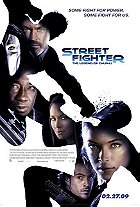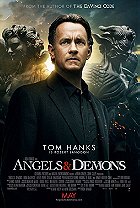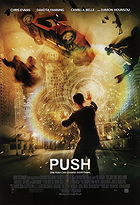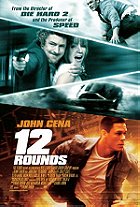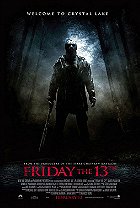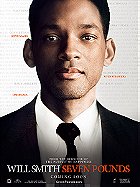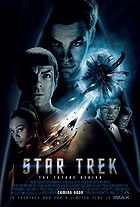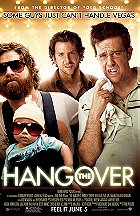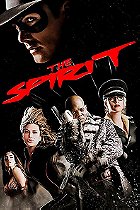"She is the love of my life. And I am her spirit."
Prior to helming The Spirit, a screen adaptation of Will Eisner's comic book series, Frank Miller had scripted the woeful RoboCop III and had co-directed the extraordinary Sin City (with Robert Rodriguez). Merely a few minutes into The Spirit, it's agonisingly clear who the real cinematic talent behind Sin City was. Miller (himself a legend in the realm of graphic novels) directs solo for the first time for The Spirit, and the product is this definitive showcase of what can go wrong if a comic book artist seizes the reigns of a celluloid production. For Miller's directorial debut, the sense of visual style becomes so pervasive that it overwhelms everything else, especially (and most detrimentally) plot. Alas, the eye candy grows stale and repetitive, unlike Sin City which coupled the mind-blowing visuals with engaging, fast-paced stories. The visuals cannot be faulted in their execution, but there's little holding the film together - The Spirit is just pretty pictures connected with tin-eared dialogue and cardboard characters. Frank Miller deserves credit for being a comic book visionary, but - to quote Dirty Harry - a man's got to know his limitations. Due to the quality of this tosh, Miller may not direct a major studio film on his own ever again. The Spirit is a mess - it's hollow, directionless and self-indulgent. It seems that in order to keep a film tightly-plotted and well-paced, Miller needs a guiding hand.
The story takes place in the dreary, crime-riddled Central City. Denny Colt (Macht) was one of the metropolis' finest cops until he was killed in the line of duty before being reborn as the enigmatic masked avenger known as The Spirit. He's seemingly indestructible as his body regenerates upon sustaining injury, but the same is also true of his nemesis The Octopus (Jackson). The Octopus aims to wipe out The Spirit's beloved Central City while he also pursues the blood of Heracles which will make him immortal. Caught up in this battle is sultry jewel thief Sand Saref (Mendes) who shares a past with Denny Colt.
The Spirit simply has no idea what it wishes to be as it erratically veers across the tonal spectrum. Part neo-noir, part acid trip and part black comedy, this feature is like Dick Tracy, Sky Captain and the World of Tomorrow, The Phantom, and the '60s Batman TV series rolled into one...but minus their respective charms. Goofy slapstick punctuates the action, and the gorgeous CGI-augmented visuals (which evoke Sin City) are at odds with the awful campy approach. Samuel L. Jackson as The Octopus wields a large pipe-wrench, traps The Spirit in a toilet (complete with a lame one-liner) and melts a cat down to a couple of eyeballs. There's a scene featuring Jackson and Scarlett Johansson dressed as Nazis - for absolutely no reason - that drags on for ten minutes straight, and The Octopus hates eggs. The guns resemble something out of the Looney Tunes as well! This is also a PG-13 film, meaning intense violence is out. If Miller had crafted either a hard-edged Sin City-esque noir or a straight-up campy parody, then The Spirit might've worked. As it is, this nonsense fails as a film noir, a comic book movie, and as a dark comedy.
In cinematically adapting Will Eisner's acclaimed comic book series, director Miller has opted to employ techniques similar to those that were used so effectively in Sin City - i.e. the majority of the film was shot in front of a green screen. By working with a digital set, Miller is able to craft a motion picture that looks almost identical to its comic book equivalent (even occasionally copying specific shots from the comic). There's a lot of computer generated imagery and animation here, with silhouettes and shadows playing a big part in the visual palette. The digital format suits the source material, allowing the filmmakers to combine the fantastical with gritty hyper-realism. However, the green screen noir visuals no longer sparkle as much as they did in Sin City; feeling imitative as opposed to innovative. It seems Miller is so focused on bloating his flick with one-note characters and stabs at slapstick that he neglects story and pacing. Consequently, there's no sense of forward momentum. The overacting, the bland story and Miller's tepid direction prevent pulses from speeding up as well. The visuals are impressive, but there's just no story to serve them. Scenes just happen, often with no clear beginning or end.
The dialogue is utterly atrocious, the acting is embarrassing, and the drama is corny to the point of laugh-inducing. And this kills any element of suspense or tension. There's a certain artistry in crafting crime dialogue, and Frank Miller has shown he can successfully pull off such dialogue as his Sin City graphic novels are perfect examples of the form. However, Miller's gifts aren't palpable while watching The Spirit. Lines such as "My city screams. She is my lover and I am her spirit" are delivered with gusto but sound awful. Admittedly, some of the levity is in place on purpose, but Samuel L. Jackson's over-the-top monologues probably aren't meant to be worthy of chortles. The Octopus is not sinister...he's silly! As for The Spirit...he's far too dull and personality-deficient to be able to hold together an entire movie. He's easily the least interesting of all the main characters, unfortunately. Miller uses roof-running as a substitute for action, and the film misses much of the quirky charm and humanity of the Will Eisner comic book series. Ultimately, this grossly mishandled adaptation lacks emotion and is hollow at its core. It's just plain boring.
The Spirit is a movie without a direction, a vision, or a definitive path - it's all over the place! Frank Miller is even unable to commit to a time period to set the film in. Characters look and dress as if they're living in the 1940s, and talk as if this is a Double Indemnity parody. They also drive classic automobiles straight out of the 40s. In addition, women run their own hospitals and perform complicated surgical procedures. Every office has a Xerox machine, ostensibly in order for Miller to concoct a scene in which Eva Mendes photocopies her rear end (bear in mind the Xerox machine wasn't invented until the 60s, conflicting with the 40s atmosphere). This eventually leads to a cheesy double entendre.
Gabriel Macht's performance, much like the film's tone, is all over the map. The blame should lay with the director rather than the actor in this case, though. He's a dark avenger one moment, a snappy-talking noir character the next. And he's always - always - monologuing! Miller aimed to bring all the comic book thought-balloons to life using constant monologues, but it gets very tired very fast. And as for Samuel L. Jackson playing The Octopus...he has never been hammier. At the other end of the spectrum are the femme fatales, all of which are attractive but vapidly performed. There's an almost unrecognisable Scarlett Johansson as The Octopus's number one henchman, and Eva Mendes as a bad girl obsessed with shiny things.
2008 was an above-average year for comic book movies (Iron Man, The Dark Knight) until The Spirit reared its ugly head. The critics had a right to pound this one into the ground. While Miller's directorial debut is watchable on account of a few rousing scenes (the initial five minutes foster the false impression that greatness will ensue) and technical competency, the negatives far outweigh the positives. Miller simply lacks the chops as a filmmaker to handle a motion picture on his own. The Spirit is indefensible; a ridiculous mishmash of random, disconnected scenes and boring speeches. The action lacks excitement, the humour is too campy, and the drama is half-baked. Stick with Sin City.
4.2/10
 Login
Login
 Home
Home 183 Lists
183 Lists 1670 Reviews
1670 Reviews Collections
Collections
 0 comments,
0 comments, 